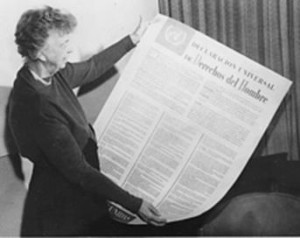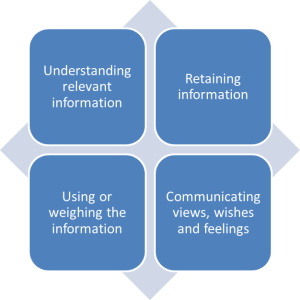Considering Mental Capacity
When considering someone’s mental capacity its is important to bear in mind that the right to self-determination is enshrined in law.
In 1948 Eleanor Roosevelt, as the chair of the United Nations Human Rights Commission, was the driving force in creating the Universal Declaration of Human Rights Act (1948).
Since 1948 there have been laws passed in many countries stating that people with communication disabilities should have equal rights, including and specifically in the complex area of mental capacity. In the United States the Federal Law that covers this is the Americans with Disabilities Act of 1990 . In the UK the key Acts of Parliament are the Mental Capacity Act (2005) England and Wales and the Adults with Incapacity Scotland Act (2000).
The UK Acts specifically focus on mental capacity and say that every adult has the right to make decisions unless proved otherwise and that each individual has a different capacity to make decisions about different aspects of their life. In addition they state that we must assume that someone has Capacity unless it is established that the person has substantial difficulty in one or more of the following criteria in the following diagram.
There are a number of important expectations behind these Acts which are particularly significant for people with communication difficulties.
- Everyone should be supported to make their own decisions (including Augmentative and Alternative Communication methods)
- Adults should be encouraged to make use of their skills and to learn new ones where that would be helpful
- Information to support understanding needs to be given in a way that is appropriate to his/her circumstances (using simple language, visual aids or any other means).
- People are entitled to make their decision – this is not about what we think is good or bad
- Judgements on capacity:
- cannot be based on age, behaviour or disability
- need to be made decision by decision – (so not being able to make more complicated decisions does not apply to all decisions)
- cannot be based on past experience of decisions – they need to focused on the here and now
- must take into account the adults socio-cultural circumstances wherever relevant
- where a person is able to retain the information relevant to a decision for a short period only, this should not prevent him or her from being regarded as able to make the decision
- If someone is judged to lack capacity then decisions must be in their best interest and any measures taken on their behalf are to be the least restrictive to the person
- It is important to assess people when they are in the best state to make the decision
Please let us know how you deal with self-determination and capacity issues where you work.
In a future post I will explain how Talking Mats can help support decision making and the identification of Capacity.
 Online training login
Online training login 






